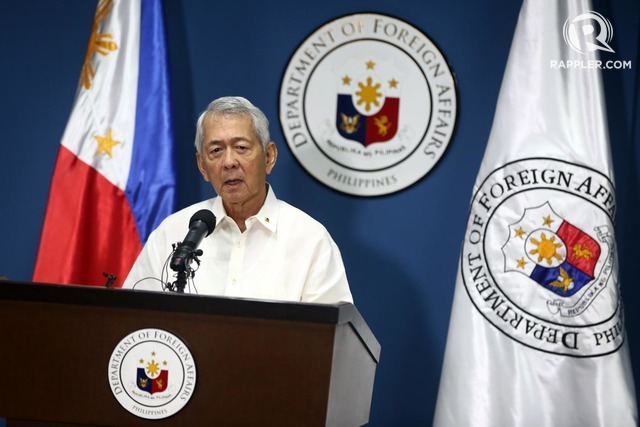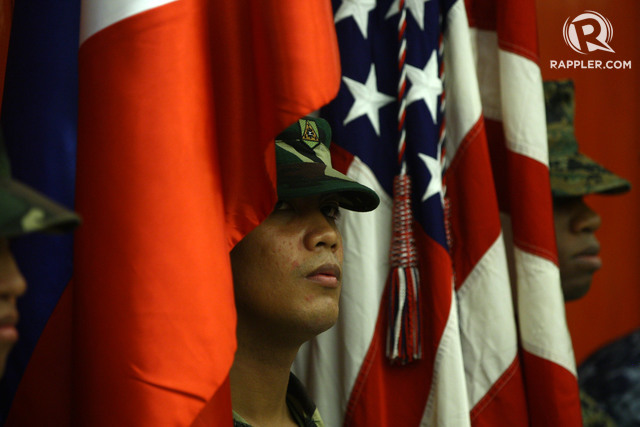TURNOVER OF COMMAND -- Philippine Air Force 1st Air Division commander, B/Gen. Enrique Reyes, presided the turnover of command responsibilities between outgoing PAF Tactical Operations Group 1 commander, Lt/Col. Onorlie Brillantes and incoming commander, Lt/Col. Thad Rufino Candelario at the Baguio Airport last week. The new commander has vowed to continue the tradition of excellence of PAF-TOG1. -- Harley Palangchao
The new commander of the Philippine Air Force Tactical Operations Group 1 vowed to continue the tradition of excellence the unit has established in serving the people and institutions in Northern Luzon.
Lt/Col. Thad Rufino Candelario, new PAF-TOG1 commander, said the unit he will lead has achieved its targets in the previous years and it is matter of sustaining its gains while innovation will take its natural course.
Candelario, a member of the Philippine Military Academy Class of 1993 and a known military strategist, will put into action his vast experience in military service on how to further improve the logistical and operational capabilities of PAF-TOG1.
PAF-TOG1, over the years, have expanded its linkages with government agencies and private institutions resulting to excellent partnership in non-combat missions such as search and rescue, civil relations, relief efforts, anti-illegal drugs and illegal logging operations.
The unit has been adjudged back-to-back best group of the 1st Air Division of PAF for 2015 and 2016 under the leadership of Col. Dennis Estrella and Lt/Col. Onorlie Brillantes, respectively.
Candelario, a member of the Philippine Military Academy Class of 1993 and a known military strategist, will put into action his vast experience in military service on how to further improve the logistical and operational capabilities of PAF-TOG1.
PAF-TOG1, over the years, have expanded its linkages with government agencies and private institutions resulting to excellent partnership in non-combat missions such as search and rescue, civil relations, relief efforts, anti-illegal drugs and illegal logging operations.
The unit has been adjudged back-to-back best group of the 1st Air Division of PAF for 2015 and 2016 under the leadership of Col. Dennis Estrella and Lt/Col. Onorlie Brillantes, respectively.
B/Gen. Enrique Reyes, PAF 1st Air Division commander, who presided over the turnover of command responsibilities between Villanueva and Brillantes, commended the men and women of PAF-TOG1 for elevating the bar of excellent military service in Northern Luzon.
This, even as Reyes challenged all PAF-TOG1 officers and personnel to be ready at all times to serve the Filipinos especially in time of natural calamities.
“Every time we have the opportunity to save lives, let’s do it,” Reyes said.
In a private dialogue with PAF-TOG personnel, Reyes rallied them to support the government’s all-out campaign against illegal drugs.
Reyes said the declaration of state of lawlessness has mandated the three major services of the Armed Forces of the Philippines – PAF, Philippine Navy and the Philippine Army to complement police operations.
Reyes made the same directive to all units under his division.
Aside from TOG 1 other units are TOG 2 based in Cauayan, Isabela; TOG 3 based in San Miguel, Tarlac; TOG 4 based in Lucena City and TOG 5 based in Legaspi City.
This, even as Reyes challenged all PAF-TOG1 officers and personnel to be ready at all times to serve the Filipinos especially in time of natural calamities.
“Every time we have the opportunity to save lives, let’s do it,” Reyes said.
In a private dialogue with PAF-TOG personnel, Reyes rallied them to support the government’s all-out campaign against illegal drugs.
Reyes said the declaration of state of lawlessness has mandated the three major services of the Armed Forces of the Philippines – PAF, Philippine Navy and the Philippine Army to complement police operations.
Reyes made the same directive to all units under his division.
Aside from TOG 1 other units are TOG 2 based in Cauayan, Isabela; TOG 3 based in San Miguel, Tarlac; TOG 4 based in Lucena City and TOG 5 based in Legaspi City.
Also under the 1st Air Division is the 600th Air Base Wing, which maintains and secures Clark Air Base in Angeles City, Pampanga, where the division headquarters is based.
Brillantes, a member of PMA Class 1994, will be assigned to the PAF Flying School in Fernando Air Base, Lipa City.
Brillantes, a member of PMA Class 1994, will be assigned to the PAF Flying School in Fernando Air Base, Lipa City.






